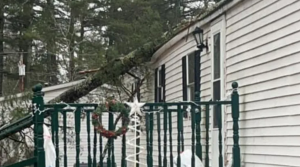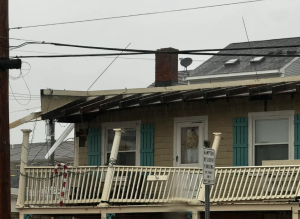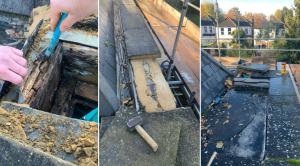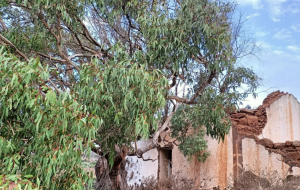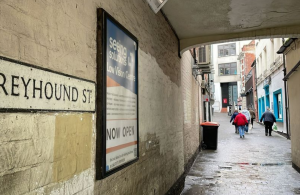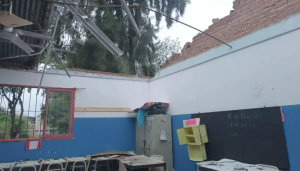
By Minara Begum
Climate change is forcing people to move from the coastal areas of Bangladesh and into cities. The people move on, but their lives are never the same.
The roof was missing from my home. My neighbour was dead.
The corpses were everywhere: strewn over paddy fields, in ditches and under trees.
The day following Sidr, 2007, which was the most deadly cyclone in Bangladesh’s history. In Barguna in the remote south of Bangladesh, I was at my home village.
The previous night was still a blur. After running half an hour, we reached the shelter for cyclones at 2am. It was so windy, I thought we would all be blown off.
When we arrived at the shelter, for a short time the wind stopped. As we looked out the tiny square window at the side of shelter, wind started to pick up. The wind was even stronger this time.
It was then that I witnessed my neighbor die.
A small group was there with their cows. The front was my neighbour. We were running across the field in order to reach the shelter. The group had just run past a row mango trees, when the Payra River, which was six kilometres wide, grew and towered over the small group. As the crows fleeing from the mango trees, a black cloud appeared.
Waves swept across the fields. Water was all I saw. The mango trees were all drowned, as well as the cows and people.
The shelter was dark and long. Nobody slept. The storm prevented us from going out to help people on the ground. Wind and rain pounded the shelter throughout the night. The bravest of us all knew it was dangerous to step outside.
The wind finally stopped as the sun came up, and stormwater began to flow back into the river. It was like a field of animal corpses.
As we walked to our home, we were met with an empty piece of earth. Only my sewing machine remained. The prehistoric cast-iron behemoth couldn’t even be moved by a cyclone. Our entire one-roomed tin home had been blown away by the wind.
The strongest part of my house, a corrugated sheet of iron was the thing I sought. It was the fifth time I had searched in my lifetime, and it would be the fifth time that our home had been damaged.
Sidr was hit in a different way. When our home was last destroyed a few years ago, I immediately began to rebuild it, using hogla pata, or elephant grass, as mats. It was a beautiful pattern, an incredibly small universe made up of yellow squares. This gave me some hope. The next time I was without hope. It was not worth the effort to build it again only to watch it be destroyed. It was not enough to withstand a six-storm.
As I searched for the top of the building, I found the bodies of my neighbors.
When I saw the plot of land where once our home stood, I looked up at my husband, who said exactly what I thought, “Enough.” We should leave. “Let’s leave this place and go to Dhaka.”
The life between storms
Born on the banks of the Payra River. My cousin was a school teacher and I copied everything that he did. I always wanted to be a teacher. Sadly, my dream ended when I completed primary school. The year following, my parents got married. When I was 14, my parents married me off.
My husband farmed on leased land. The landowner received two-thirds and my husband kept the other third. In most years we planted two rice plants and one crop of vegetables, which was usually potatoes, on a quarter-acre. We would not have made any profit if one of these three crops had failed.
Our first child started school and we were able to survive. Then, we had to do more to ensure that we would be able pay for his fees. I learned how to use my older sister’s pedal-driven machine and began tailoring at home. In a perfect world, I could make $2 on a day. But those days are rare.
As our income from farming declined, sewing became essential. The floods and the cyclones devastated the rice crop, and the chilli plants suffered from lethal winter chills. Next, pests attacked the cucumbers, beans and eggplant.
There were also the hurricanes that blew our home away every two years.
Now they had given me a new name: a climate migrant
My husband, myself and our children said farewell to Barguna once the decision was made. The only thing we had was the clothing and the few things that were taken to the shelter during the cyclone, and my old sewing machine.
The river was still there, and we took one last glance at it. It had been the place where the monster of the previous day disappeared. A relative loaned us Tk1000 ($10) to purchase five tickets for the next boat available to Dhaka. We walked down to the ferry dock.
Dhaka was a place we knew nothing about. It seemed that the city went on forever. The city was awash with people. They were in alleys, on roadsides, in doorways, and leaning against street signs. Everywhere, there were people selling different things.
A family without money is not going to find it very helpful. Barguna smelled of cows, soil and rain. It was characterized by tall palms trees and twisting rivers. Dhaka smelled of sweat, burning plastics and dust. Drains were blocked by rubbish. And there was a lot of Internet cable.
Five of us shared a home with a three-person family for five days. My husband convinced the owner of a rickshaw to rent him his van after five days. The man was paid $2 per day in Tk and he could keep his profit if he didn’t have any accidents. On a great day, he brought Tk300 home ($3).
He would be responsible for any repairs if the van was damaged – which happened often on these narrow alleyways. Five of us rented 50 square feet and lived there. The clothes were displayed in a small space outside on the dusty road. I had to wait two years before I could save enough money to rent an office. This show is now operating for 13 years.
Some people may think that I’m doing better. My oldest son is now a father. My daughter studies to be a nurse. No one ever asks how I am feeling.
What I most loved was gone. The summer evenings, when the whole village would gather to sing and tell stories. Winter afternoons when we made rice cakes to celebrate harvests and feasted together with our friends. The little pleasures in life are what make living worthwhile.
My daughter was sent to Patuakhali to study nursing by a strange twist of fate. It is located near Barguna. We couldn’t pay the tuition in Dhaka, so I sent her to Patuakhali. Ironically, I could not afford to live on the coast but also I couldn’t keep my kids near me.
It’s to go back to my village, to spend the remainder of my life with my family, to sing my sorrows away, to laugh at the memory of Sidr. We could not save enough money to return me to the family I was born in.
Bangladesh ranks seventh in climate vulnerability. Bangladesh is hit by four tropical cyclones on average every year, which cost the country more than a billion dollars a year. This amounts to nearly a full month’s salary for 5 million people. Dhaka is already home to 2,000 people every day, with cyclones predicted to increase in intensity and frequency as global warming continues.
Bangladesh shows that adaptation to climate change can be successful, but needs better financing and implementation. Three principles are crucial – that adaptation is a nexus of development-humanitarian-climate programming, that special attention is given to the most vulnerable communities and that adaptation is locally-led.
Roof services are vital for your home’s well-being. Roofs can become damaged or leaky over time due to weather conditions. Have any problem? something that you have been looking for a solution for? Well, if so, we will give you a hand and to get better information, come here The Roof Technician roof inspection and maintenance in Toronto. Professional roofers provide comprehensive roofing solutions that include inspections, repair, re-roofing and quality materials. Expert roofers will protect your home by addressing problems promptly and preventing further damage. Residential roof replacement services are essential for a durable and secure roof covering.
